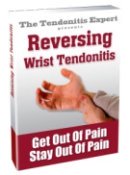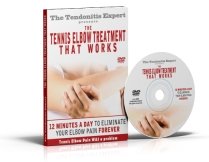Wrist Pain Diagnosis
What's Up With Your Wrist?
When our wrists hurt long enough, we start looking for a wrist pain diagnosis.
We expect that when we hurt, it will go away after a while. But when the pain stays around long enough, and when it continues to get worse, we start to get worried.
And then we want to know what it is.
Diagnosing wrist pain can technically only be done by a doctor, as for the most part only doctors have the legal right to diagnose. But that doesn't mean that you can't learn enough to come to your own conclusion, or at least narrow the options down.
Depending on what it is, a trip to the doctor may or may not be a good idea.
Wrist Pain Diagnosis
What Could It Be?
There are many reasons that your wrist could be hurting.
There are many flavors of wrist pain symptoms, behaviors, etc. It can be simple to identify, or it can get pretty tricky. Even the simple ones have complex origins.
So while it's great to get a diagnosis, it's MORE VALUABLE to understand what's -causing- the pain.
The diagnosis is NOT the cause of your wrist pain.
And a diagnosis really isn't even a full description of your problem. It's just a label. There's ALWAYS more to the story.
And just because you get a diagnosis doesn't mean your problem is solved. Diagnosis is just part of the process.
If you have wrist tendonitis, wrist tenosynovitis, wrist tendonosis, writ pain,etc, you may want to get on my free 7 lesson e-course, sign up below.
Wrist Pain Diagnosis Option
Which One Do You 'Have'?
Wrist Tendonitis
Wrist tendonitis is by far the most common cause of wrist pain.
Really it's a tendonitis -dynamic- as you'll see on the What Is Tendonitis page.
Due to time, gravity, use, diet, and the way the body naturally operates, the wrists and forearms slowly start to work less and less optimally, and pain is the end of that road.
Wrist Tendonitis is a common and easily reversible situation.
Each of the Wrist Tendonitis Symptoms has a specific cause. Everything happens for a reason. When you understand how it works, you'll have a huge edge towards making your pain go away.
Wrist Tenosynovitis
Tenosynovitis is a variation of Tendonitis. The pain is worse and more intense, the level of irritability is much more acute, and the fix takes a bit more time and attention.
Too tight muscles and connective tissue, long story short, irritate the tendon sheath and make it VERY unhappy. Then the brain thinks there's a problem so it protects you with more pain and tightness.
See any obvious problem with that? If you don't, read that paragraph again.
Lipoma
A Lipoma is a benign fatty tumor. Basically, it's a fatty growth.
While this can cause pain, it's more of a symptom of a deeper problem. Lipoma's usually show up in spots where there's too much structural tension.
Surgery can remove a lipoma but they usually continue to grow because the forces that caused it to develop aren't made better (not even a little bit) by surgery.
If you have a gel-like, semi-squishy bump there at the wrist, you could have a Lipoma. Go see a doctor just to make sure.
Lipoma's aren't dangerous, but they can grow to become problematic, and it would be a good idea to improve the health of your forearm/wrist/hand so the Lipoma will stop growing.
See: Lipoma
Ganglion Cyst
A ganglion cyst, historically called a 'bible cyst' (in the U.S., at least), is a encapsulated swelling that can show up in a variety of places on the wrist, most commonly the back of the hand side.
They can be surgically removed, or punctured and drained. Or, ya know, you can hit it with a heavy book.
In all the above scenarios, it's likely to eventually return.
Ganglion cysts aren't dangerous but can become very painful. Some people have them with no symptoms, others with a lot of pain.
You'll know you have a cyst because you'll have a lump/bump/swelling/growth on your wrist.
See: Ganglion Cyst
Carpal Tunnel Syndrome
Carpal Tunnel Syndrome shares all the same factors as Wrist Tendonitis, but also includes numbness and/or tingling.
The nerve is being compressed at the wrist and/or higher up the arm, even at the front of the neck and shoulder.
There's a lot to know about CTS, so go read the Carpal Tunnel Syndrome page if you have wrist pain with numbness and/or tingling.
Essentially, things are too tight and that causes problems.
Nutritional deficiency is also a cause of Carpal Tunnel Symptoms.
Nutritional Insufficiency/Deficiency
Imagine getting surgery for wrist tendonitis or carpal tunnel syndrome and then discovering that all your symptoms were just from nutritional deficiency.
Oops!
WARNING! YOU WILL NEVER GET A DIAGNOSIS OF NUTRITIONAL DEFICIENCY FROM A DOCTOR EXAMINING YOU FOR WRIST PAIN
The fact is, you can have wrist pain just from your body being short of necessary nutrition.
For instance, learn about Carpal Tunnel and Vitamin B6 Deficiency.
It's also valuable to know that if you have a Tendonitis dynamic (increasing muscle and connective tissue tightness), then you have an inflammation process. And if you have inflammation, guess what?
Inflammation Causes Vitamin B6 Deficiency
Any wrist pain diagnosis must take into account nutritional factors. Be forewarned though, doctors don't pay any attention to nutrition if you have pain in your wrist(s).
Wrist Pain Diagnosis
Get To Work!
Whether you get a wrist pain diagnosis or you don't, it's important to know that the pain in your wrist or wrists didn't just show up out of the blue.
Pain shows up for a reason. Always.
If you have wrist pain, you should be aware of the Pain Causing Dynamic
And it wouldn't hurt to learn How To Reduce Inflammation.
If you're in pain, there are definitely things you can do to get rid of that pain.
First learn, then do.
There is only one real method to get rid of wrist pain...and that's the RIGHT ways of dealing with ALL the factors involved. THere is not silver bullet, no one trick pony, that's going to work. So if your doctor prescribes you a simple, singular method like rest, or anti-inflammatories....personally I wouldn't put money on it working like you want it to. (And as always, Quiz Your Doctor!)
Return to the top of this Wrist Pain Diagnosis page.
Go to the main Tendonitis page.
Go to the www.TendonitisExpert.com homepage.
| Share Your Story
|



